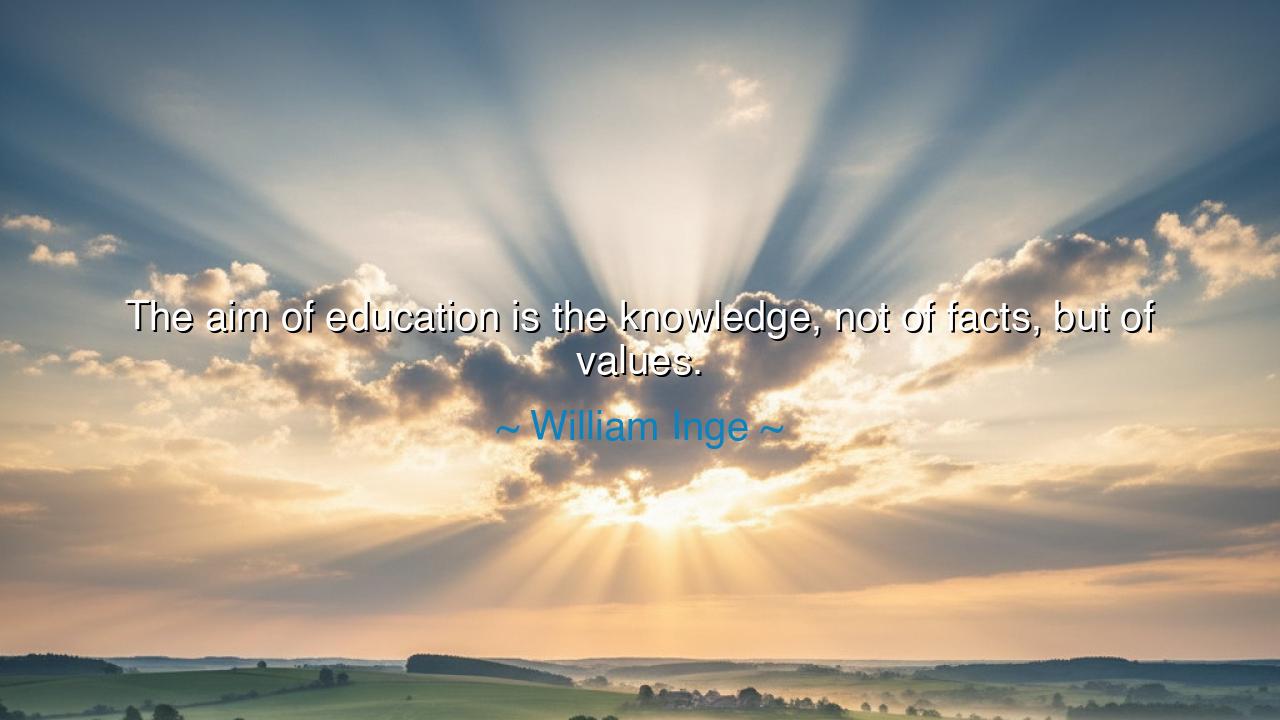
The aim of education is the knowledge, not of facts, but of






In the words of William Inge, “The aim of education is the knowledge, not of facts, but of values.” These words fall upon the heart like sacred rain upon dry earth. For in this age—and in all ages past—men have mistaken the gathering of facts for the gaining of wisdom. They fill their minds as one fills a chest with stones, believing weight to be worth. Yet the wise know that knowledge without values is like light without warmth — it illuminates but does not give life. Education, if it is to serve the soul, must teach not only what is true, but what is good; not only how to think, but how to be.
In the ancient days of Athens, there stood a man named Socrates, who walked barefoot through the streets, teaching not from scrolls or numbers, but from questions. He spoke of justice, of virtue, of the inner life of man. He sought not to instruct the youth in the facts of the world, but in the meaning of being human. For he understood that a mind crammed with information but empty of morality becomes a danger to itself and to all creation. It was this teaching — the pursuit of values over mere knowledge — that gave rise to the golden age of wisdom, and it is this same truth that Inge now whispers across time.
Facts are the bones of knowledge, but values are its breath. Facts tell us how to build a weapon; values tell us whether we should use it. Facts can count the stars; values can see the divine in them. Facts may reveal the laws of nature, but values reveal the laws of the soul. Without values, learning becomes a cold and cunning art — powerful, yes, but directionless. It is like giving wings to one who has lost his sense of north. Thus, Inge reminds us: the purpose of education is not to make us clever devils, but wise beings.
Consider the story of Mahatma Gandhi, who studied law in the grand halls of London, mastering every fact of his discipline. Yet when he returned to India, he found that mere knowledge could not heal the wounds of his people. It was values — truth, compassion, and nonviolence — that became his true teachers. These virtues transformed his learning into action, his intellect into purpose, his education into service. From that union of wisdom and goodness arose a movement that freed a nation. Gandhi’s life stands as a living testament that the highest education is not of the mind alone, but of the heart.
The danger of our times — as it was in every era — is that we confuse information with understanding. The world now swims in data, yet starves for meaning. Children learn the names of distant planets but forget how to be kind to their neighbor. We teach them how to compete, but not how to care; how to earn, but not how to serve. When education becomes an industry of memory rather than a temple of virtue, civilization itself begins to crumble. For it is not ignorance that destroys nations, but the cleverness of men who have forgotten values.
Let us then remember: education is not a race to accumulate, but a pilgrimage to awaken. To educate the mind without educating the conscience is to forge a sword without a hand to guide it. The true teacher, therefore, is not one who fills the student with facts, but one who lights the fire of discernment — who teaches the difference between what can be done and what should be done. In every lesson, let there be reflection; in every discovery, a question of purpose.
The lesson, dear listener, is this: seek not to know everything, but to know what matters. Cultivate values as you would cultivate a garden — with care, patience, and reverence. Learn honesty, for it builds trust; learn compassion, for it softens hearts; learn humility, for it opens the path to wisdom. Let your knowledge serve your values, not the other way around. For it is not the learned who shall lead the world to peace, but the wise.
And so, as William Inge spoke, so let it be written in our hearts: the truest education does not end with the knowing of facts, but with the becoming of a better soul. Facts change with the ages, but values endure beyond them — they are the eternal flame by which humanity finds its way through the dark. Guard that flame, nurture it, and carry it forward, for it is the light of civilization itself.






AAdministratorAdministrator
Welcome, honored guests. Please leave a comment, we will respond soon